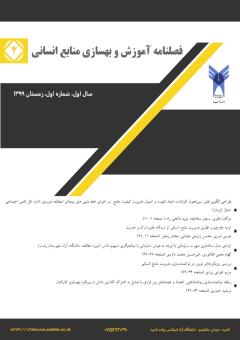واکاوی و اعتبارسنجی مدل فراموشی سازمانی مدیران مقطع دوم متوسطه
محورهای موضوعی : آموزش منابع انسانینسرین اقایی 1 , مژگان امیریان زاده 2 * , رضا زارعی 3 , احمدرضا اوجی نژاد 4
1 - دانشجوی دکتری گروه مدیریت آموزشی واحد مرودشت.دانشگاه آزاد،مرودشت، ایران
2 - استادیار گروه مدیریت آموزشی، واحد مرودشت، دانشگاه آزاد اسلامی،مرودشت. ایران.
3 - استادیار گروه مدیریت آموزشی، واحد مرودشت، دانشگاه آزاد اسلامی، مرودشت، ایران.
4 - استادیار گروه مدیریت آموزشی، واحد مرودشت، دانشگاه آزاد اسلامی،مرودشت. ایران.
کلید واژه: اعتبارسنجی, فراموشی سازمانی, مدیران متوسطه,
چکیده مقاله :
پژوهش حاضر با هدف طراحی و اعتباریابی مدل فراموشی سازمانی در مدیران متوسطه¬ی دوم استان فارس انجام شد. روش پژوهش آمیخته بود. فاز اول پژوهش، کیفی بود که با استفاده از روش تحلیل مضمون و رویکرد شبکه مضامین آتراید استرلینگ (2001) انجام گردید. بر مبنای اصل اشباع نظری از تعداد 21 نفر از مدیران با استفاده روش نمونه¬گیری هدفمند، مصاحبه نیمه ساختمند انجام گرفت. برای اعتباریابی یافته¬ها از معیارهای لینکولن و گوبا(1985) استفاده شد. روش پژوهش در فاز کمی، توصیفی- پیمایشی و جامعه آماری شامل 570 نفر از مدیران بودند که با روش نمونه¬گیری تصادفی ساده و جدول مورگان کرجسی (1970) تعداد 234 نفر برگزیده شدند. ابزار گردآوری داده¬ها پرسشنامه محقق ساخته بود که روایی محتوایی و صوری آن توسط 30 نفر از متخصصان تأیید گردید و روایی سازه با استفاده از تحلیل عاملی تأییدی و مدل معادلات ساختاری انجام پذیرفت. پایایی ابزار نیز با استفاده از ضریب آلفای کرونباخ 94% برآورد گردید. داده¬ها طی سه مرحله کدگذاری (باز، گزینشی و انتخابی) مورد تجزیه و تحلیل قرار گرفتند. نتیجه خروجی فاز کیفی 98 کد باز، 12 کد محوری و 4 کد گزینشی بستر سازی، یادگیری زدایی، جایگزین سازی و جو باز بود. بود. نتایج بخش کمی حاکی از این بود که مدل از برازش مطلوبی برخوردار است. سازمان تنها به دنبال یادگیري دانش جدید نیست بلکه فراموش کردن دانش قدیم نیز می¬تواند مدنظر باشد. به عبارت دیگر اگر یادگیري منافعی را براي هر سازمان به ارمغان می¬آورد، یادگیري زدایی و فراموشی سازمانی به سازمان کمک می¬کند تا بهتر یاد بگیرد.
The present study was conducted with the aim of designing and validating the model of organizational forgetfulness in secondary school principals of Fars province. The research method was mixed. The first phase of the research was qualitative, which was conducted using the method of theme analysis and the theme network approach of Atride Stirling (2001). Based on the principle of theoretical saturation, a semi-structured interview was conducted with 21 managers using the purposive sampling method. The criteria of Lincoln and Guba (1985) were used to validate the findings. The research method in the quantitative, descriptive-survey phase and the statistical population included 570 managers, 234 of whom were selected by simple random sampling method and Morgan Karjesi table (1970). The data collection tool was a researcher-made questionnaire, whose content and form validity was confirmed by 30 experts, and construct validity was performed using confirmatory factor analysis and structural equation models. The reliability of the tool was also estimated using Cronbach's alpha coefficient of 94%. The data were analyzed during three stages of coding (open, selective and selective). The output of the qualitative phase was 98 open codes, 12 core codes, and 4 selective codes of embedding, delearning, substitution, and open atmosphere. Was. The results of the quantitative part indicated that the model has a good fit. The organization is not only looking for learning new knowledge, but forgetting the old knowledge can also be considered. if learning brings benefits to any organization, organizational forgetting will help the organization to learn better.
1. Alves, L., Abreo, L., Petkari, E., & da Costa, M. P. (2023). Psychosocial risk and protective factors associated with burnout in police officers: A systematic review. Journal of Affective Disorders.
2. Attride-Stirling, J. (2001). Thematic networks: an analytic tool for qualitative research. Qualitative Research, 1, 3, 385-405. 3. Becker, K. (2019), “Organizational unlearning: The challenges of a developing phenomenon”, The Learning Organization, in press.
https://doi.org/10.1108/TLO-05-2019-0082. 4.
Bongers, A. (2023). Learning by doing, organizational forgetting, and the business cycle. Bulletin of Economic Research. 5. Drodian, Ali Azar and Ghafarzadeh, Mohammad Reza. (1401). The effect of talent management on targeted organizational forgetfulness with the mediating role of organizational agility (Case study: General Directorate of Sports and Youth of Tehran Province). Management and organizational behavior in sports. Year 11, number 5, pp. (1-13).
6.
George, G., Haas, M.R. and Pentland, A. (2014), “Big data and management”, Academy of Management Journal, Vol. 57 No. 2, pp. 321-326. 7. Hasanpour, Akbar, Jafrinia, Saeed, Vakili, Youssef and Marashi, Seyedjavad. (1401). The model of factors affecting the formation of the phenomenon of organizational forgetting in government organizations. Management studies, improvement and transformation - number 103 (18 pages - from 98 to 115).
8. Klammer, A. (2021). Embracing Organisational Unlearning As A Facilitator Of Business Model Innovation. International Journal of Innovation Management, 25(06), 2150061.
9. Kluge, A., & Gronau, N. (2020). Intentional Forgetting in Organizations: The Importance of Eliminating Retrieval Cues for Implementing New Routines. Frontiers in psychology, 9, 51- 6.
10. Mariano, S., Casey, A. and Oliveira, F. (2020), "Organizational forgetting Part II: a review of the literature and future research directions", The Learning Organization, Vol. 27 No. 5, pp. 417-427.
11. Yeh, L. T., Tseng, M. L., & Lim, M. K. (2020). Assessing the carry-over effects of both human capital and organizational forgetting on sustainability performance using dynamic data envelopment analysis. Journal of Cleaner Production, 250, 119584 12. Zeng, H., Ran, H., Zhou, Q., Jin, Y., & Cheng, X. (2022). The financial effect of firm digitalization: Evidence from China. Technological Forecasting and Social Change, 183, 121951.

